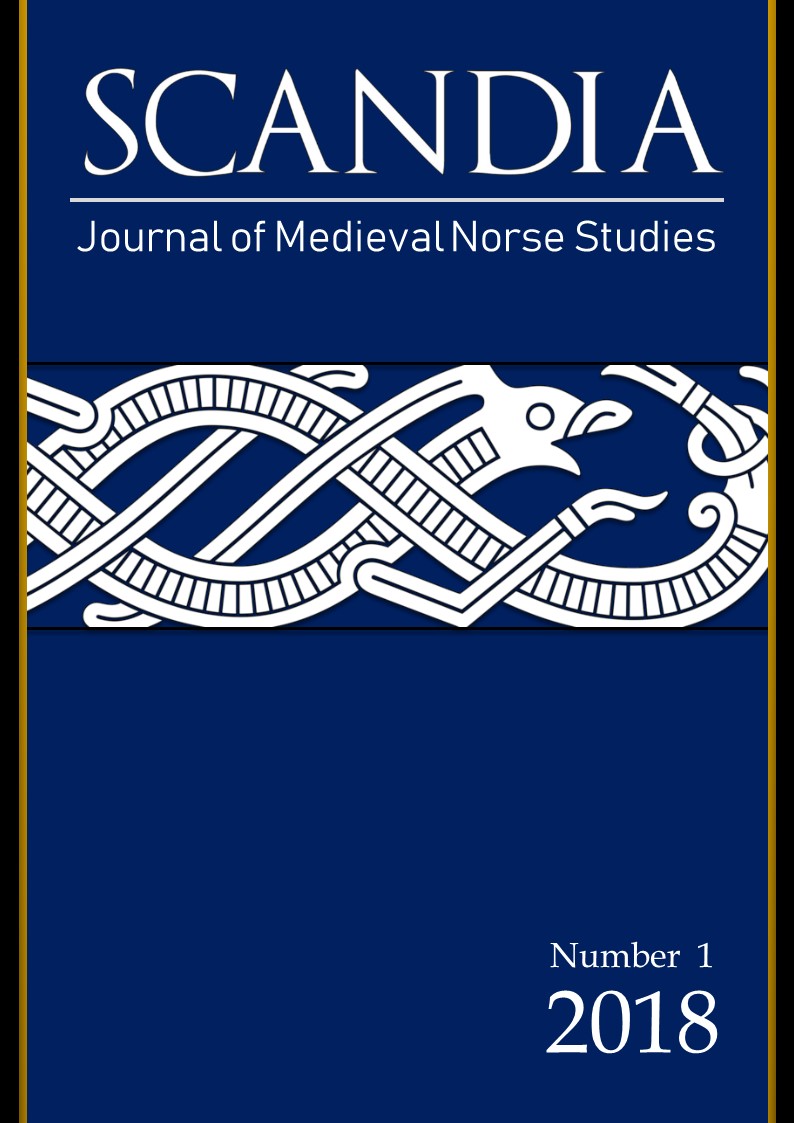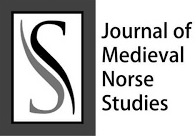Vǫluspá, a profecia da vidente: notas e tradução
Abstract
Abstract: Direct translation from Old Norse to Portuguese with notes of the Old Norse poem Vǫluspá. The poem in question have its oldest registry in a manuscript from 13th century, Codex Regius, GKS 2365 4to, which is one of the most important poetic source for the study of old norse religion, mythology and literature, where the cosmogonic and eschatological events are narrated by a prophetess through a monologue heard by the god Óðinn.
Resumo: Tradução direta do nórdico antigo para português e anotações do poema nórdico antigo Vǫluspá. O poema em questão tem o seu registro escrito mais antigo em um manuscrito do século XIII, Codex Regius, GKS 2365 4to, que se configura como uma das fontes poéticas mais importantes para o estudo de religião, mitologia e literatura nórdico antiga, onde os acontecimentos cosmogônicos e escatológicos são narrados por uma profetisa através de um monólogo ouvido pelo deus Óðinn.
Downloads
References
Bibliographical references:
Fontes Primárias
Anônimo. Vǫluspá. In.: KRISTJÁNSSON, Jónas; ÓLASON, Vésteinn. Eddukvæði – vol. I Goðakvæði. Reykjavík: Hið Íslenzka Fornritafélag, 2014, pp. 291-321.
BOYER, Regis. L’Edda Poétique. Paris: Fayard, 1992.
DRONKE, Ursula. The Poetic Edda: volume II - mythological poems. Claredon Press: Oxford, 1997.
LARRINGTON, Carolyne. The Poetic Edda. Oxford: Oxford University Press, 2014.
LERATE, L. Edda Mayor. Madri: Alianza Literaria, 2009.
Fontes Secundárias
EGILSSON, S. Lexicon Poeticum – antiquæ linguæ septentrionalis, Vol. I. Copenhagen: S. L. Møllers Bogtrykkeri, 1913 – 1916.
EGILSSON, S.; JÓNSSON, F. Lexicon Poeticum – antiquæ linguæ septentrionalis, Vol. II. Copenhagen: S. L. Møllers Bogtrykkeri, 1931.
GOULD, Chester Nathan. A Study in Old Icelandic Religion. In: PMLA, v. 44, n. 4, 1929, pp. 939-967
HULTGÅRD, Anders. The Askr and Embla Myth in a Comparative Perspective. In: ANDRÉN, Anders; JENNBERT, Kristina; RAUDVERE, CATHARINA (org.). Old Norse Religion in Long-Term Perspectives – origins, changes and interactions. Lund: Nordic Academic Press, 2004, pp. 58-62.
LANGER, Johnni. Völuspá. In: LANGER, Johnni (org.). Dicionário de Mitologia Nórdica - símbolos, mitos e ritos. São Paulo: Hedra, 2015a, pp. 555-557.
____. Ymir. In: LANGER, Johnni (org.). Dicionário de Mitologia Nórdica - símbolos, mitos e ritos. São Paulo: Hedra, 2015b.
LINDOW, John. Norse Mythology: a guide to the Gods, Heroes, Rituals, and Beliefs. Nova Iorque: Oxford University Press, 2001.
MIRANDA, Pablo Gomes de. Grímnismǫ́l - os ditos de Grímnir. In: Roda da Fortuna, v. 3, n. 2, 2014, pp. 301-325.
O’DONOGHUE, Heather. The Reception of Eddic Poetry. In: LARRINGTON, Carolyne; QUINN, Judy; SCHORN, Brittany. A Handbook to Eddic Poetry – myths and legends of early Scandinavia. Cambridge: University of Cambridge Press, 2016, pp. 349-365.
THORVALDSEN, Bernt Ø. The Dating of Eddic Poetry. In: LARRINGTON, Carolyne; QUINN, Judy; SCHORN, Brittany. A Handbook to Eddic Poetry – myths and legends of early Scandinavia. Cambridge: Cambridge University Press, 2014, pp. 72-91.
ZOËGA, G. T. A Concise Dictionary of Old Icelandic. Toronto: University of Toronto Press, 2004.
Downloads
Published
Issue
Section
License
The author (s) of the original submitted undertake to comply with the following:
- All authors are publicly responsible for it.
- The authors claim that this original is their own and that they assume full responsibility to third parties, whether moral or patrimonial, by reason of its content, stating that the work does not infringe any intellectual property rights of third parties.
- The author (s) agree to the copyrights of the original to Scandia Journal, to which they grant permission for its reproduction, editing and online publication.
- The author (s) grant their copyright of their original to the Scandia Journal, licensed under the Creative Commons Attribution License, which allows the sharing of this work with the acknowledgment of their authorship.
- The author (s) have permission and are encouraged to cite and distribute their original.



